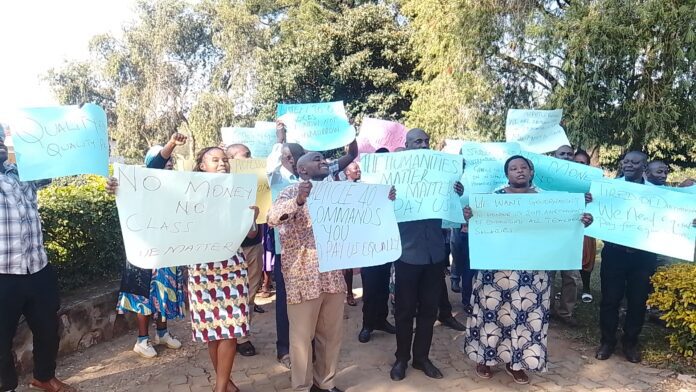The ongoing strike by arts teachers in Rukungiri District has effectively halted education, leaving thousands of students without instruction and raising deep concerns among parents, educators, and the wider community.
United under their umbrella body the Professional Human Teachers Union (UPHTU), the striking teachers are demanding salary parity with their science counterparts, a promise the government made in 2019 but has yet to fulfill.
The peaceful protest began at Riverside Hotel on June 16, 2025, where teachers gathered before marching through the streets, chanting slogans such as “No money, no class” and carrying placards that read “We want the government to honor its 2019 agreement” and “The humanities matter.” Their calls reflect deep frustration over stagnant wages and the perceived neglect of arts and humanities education.
For 11 days now, arts teachers have withheld their services, causing major disruptions to the school calendar and leaving learners stranded without qualified instructors. Fred Turamyomwe, chairperson of Rukungiri arts teachers, warned that the strike will continue until the government addresses their demands.
“Our students are the ones suffering most. They deserve equal access to quality education in all subjects, not just science,” Turamyomwe said. “We urge parents to understand our plight and support us as we push for fair treatment.”
Parents have expressed growing anxiety over the prolonged strike. Jane Kabatesi, a mother of three students in Nyakibale shared her concerns.
“My children are missing critical lessons. The strike is affecting their performance and future prospects. We need a resolution quickly,” Kabatesi stressed.
Teachers argue that the current salary of UGX 620,000 for arts educators is so little compared to the UGX 4,000,000 paid to science teachers, despite sharing similar qualifications and workloads. This inequality has led to demoralization among arts teachers and diminished respect for humanities subjects among students and the broader community.
Angela Boonabana, a humanities teacher at St. Gerald’s Secondary School, lamented, “When students see their teachers struggling to make ends meet, it sends a message that arts subjects are less important. This hurts not just us, but the entire education system.”
The strike also raises broader concerns about the future of humanities education in Uganda. With teachers calling for equal recognition and better pay, there are fears that continued neglect could lead to a decline in enrollment and interest in arts subjects, which are vital for developing critical thinking, creativity, and cultural awareness.
As the strike stretches on, the consequences extend beyond immediate classroom disruptions. The future of humanities education in Uganda hangs in the balance, with teachers’ demands highlighting the urgent need for equitable treatment across disciplines.
Without swift government intervention to address these salary disparities, the continued neglect of arts subjects’ risks undermining the diversity and richness of the nation’s education system leaving students, teachers, and communities caught in a widening divide.















